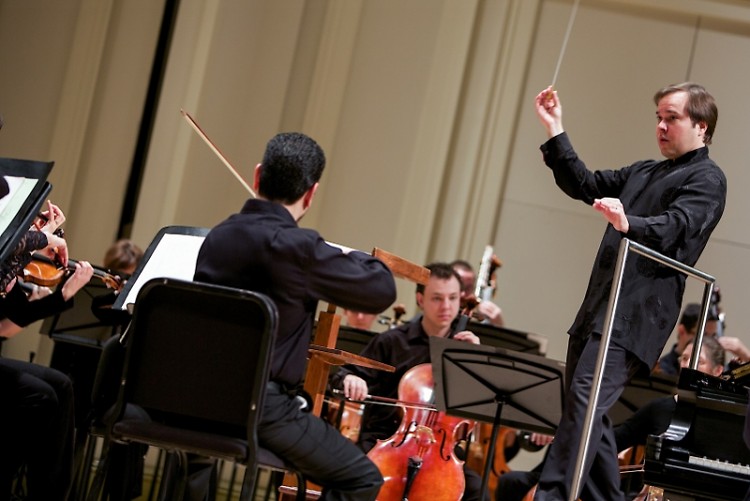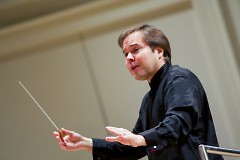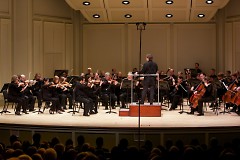In the 1920s, there really were only two ways to hear music. Commercial radio, which made its debut in the early 1920s, was still in its infancy. You could listen to 3 ½ minutes’ worth of music on a 10-inch 78 rpm record before you had to flip it over, or you could listen to music performed live.
For more than 20 years, the growing city of Grand Rapids had attempted to organize and sustain a symphony orchestra. Several attempts failed, but in the final days of 1929, a newly organized Grand Rapids Symphony gave its debut concert in the auditorium of Central High School.
Karl Wecker, who taught music at Grand Rapids Junior College, led the orchestra in music including Franz von Suppé’s “Poet and Peasant” Overture, the two movements of Schubert’s “Unfinished” Symphony No. 8, and Johann Strauss’ “The Blue Danube Waltz.”
Two weeks later, with a successful concert under its belt, the Grand Rapids Symphony Society was officially organized on Jan. 11, 1930.
As it turns out, the Grand Rapids Symphony will celebrate its 89th birthday on stage on Friday, Jan. 11, performing the music of Haydn, Mozart and Beethoven in St. Cecilia Music Center.
Today, classical music from the late 18th century remains as popular as it was more than 200 years ago. But not only is the music of Haydn, Mozart and Beethoven the heart of any orchestra’s repertoire, performing the transparent, unadorned music is fundamental to the development of any symphony orchestra.
“It’s so important for an orchestra to work on the classical repertoire. Every time we perform it, the orchestra grows,” said Music Director Marcelo Lehninger.
Lehninger will lead the orchestra in The Classical Concert: Viennese Masters, featuring Haydn’s Symphony No. 89, to commemorate the orchestra’s 89th season. The 39-year-old conductor also will lead the Grand Rapids Symphony in Mozart’s Symphony No. 39.
The PwC Great Eras series will open at 8 p.m. Royce Auditorium with the overture from Beethoven’s Creatures of Prometheus.
A one-hour version of the evening program will be performed earlier that day at 10 a.m. Doors open for The Classical Coffee Concert at St. Cecilia Music Center at 9 a.m. for an hour of complimentary coffee and pastries. The concert is part of the Porter Hills Coffee Classic series.
Highlights of the evening concert will be given at 10 a.m. that morning The Classical Coffee Concert, part of the Porter Hills Coffee Classic series, a one-hour program held without intermission. Doors open at 9 a.m. for complementary coffee and pastry.
At the end of the 18th century, continuing into the 19th century, Vienna was the music capital of Europe. It’s where Haydn, Mozart and Beethoven all lived and worked for at least part of their careers. Not surprisingly, they also all knew each other.
Haydn was old enough to be Mozart’s father, but they were friends and colleagues for about seven years, occasionally playing string quartet music together, until Mozart’s untimely death in 1791 at age 35. Each admired the other’s music. Haydn declared on a number of occasions that Mozart was the greater composer of the two. Mozart, who later dedicated six string quartets to “Papa Haydn,” wrote that it was from Haydn that he had learned how to compose for string quartet.
The youthful Beethoven, who studied briefly under Haydn and almost certainly met Mozart, was influenced and inspired by both masters in his early works. Though he usually isn't thought of as a composer for theater, one of the big hits of the spring season in Vienna in 1801 was Beethoven’s Creatures of Prometheus, the only full-length ballet he ever composed.
As it turns out, both of the symphonies by Haydn and Mozart that are featured on this program were written almost at the same time. Haydn composed his Symphony No. 89 in 1787. Mozart completed his Symphony No. 39 months later in June 1788.
An eyewitness, Iwan Anderwitsch, who heard Mozart’s 39th Symphony a few years later in Hamburg in 1792, wrote afterward, “The opening is so majestic that it so surprised even the coldest, most insensitive listener and non-expert, that even if he wanted to chat, it prevented him from being inattentive, and thus, so to speak, put him in a position to become all ears.”
The Rapidian, a program of the 501(c)3 nonprofit Community Media Center, relies on the community’s support to help cover the cost of training reporters and publishing content.
We need your help.
If each of our readers and content creators who values this community platform help support its creation and maintenance, The Rapidian can continue to educate and facilitate a conversation around issues for years to come.
Please support The Rapidian and make a contribution today.


